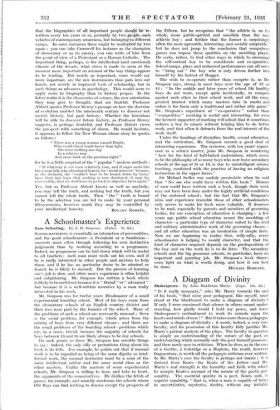A Schoolmaster's Experience.
Sane Schooling. By J. H. Simpson. (Faber. 7s. 6d.) SCII0OL31ASTERING is essentially an interaction of personalities, and the good- schoolmaster-a Pestaloze- i or .a Sanderson— succeeds more often through following-his own instinctive ' judgement than by working according to a progranime. Indeed, no programme can be laid- down which will be useful to all teachers : each man must work out his own, and if : he is really interested in Other people and anxious to help them, and if he has no particular desire to be admired or feared,' he is likely to-succeed. But the process of-learning one's job is slow, and other men's experience is often helpful „ and enlightening. Mr. Simpson has written a book which is likely to be useful not because it is " liberal" or !` advaneed " !- but because it is a well-written narrative by a man really
interested in his work. • .
Mr. Simpson was for twelve years Headmaster of a small experimental boarding school. Most Of his boys came from the elementary schools of an English country district and their fees were paid by the founder of the school. Many of the problems of such a school are necessarily unusual ; there is the social problem, for example, which arises from the mixing of boys from very different classes ; and there are the usual problems of the boarding school—problems which are, in a sense, trivial, because the majority of schools for boys between 13 and 18 are likely always to be day schools.
On such points as these Mr. Simpson has sensible things to say ; indeed, the only silly or- pretentious thing about his book is its title. For example, he points out that if manual work is to be regarded as being of the same dignity as intel- lectual work, the manual instructor must be a man of the same intellectual calibre and the same social class as the other masters. Unlike the masters of some experimental schools, Mr. Simpson is willing to hear, and take to heart, the arguments of the conservatives. He dislikes the fetish of games, for example, and roundly condemns the schools whose . 0!d Boys can find nothing to discuss except the prospects of the Fifteen, but he recognises that " the athlete is, on the whole; more public-spirited and unselfish than the non-
athletic_ boy ; and further that the former is surprisingly Often- the more agreeable, interesting, and socially adaptable," -but he does not jump to the conclusion that compulsory
games can impose these qualities on the unwilling player. He seeks, rather, to find other ways in which to encourage the self-centred boy to be considerate and co-operative. School camps, plays and orchestral performances can all serve to " bring out " the boy who is only driven further into himself by his hatred of Rugger.
The wish to co-operate rather than compete is, as Mr. Simpson says, strong in most boys over the age of 12 or 13 : " In the middle and later years of school life healthy boys do not want, except quite incidentally, to compete against each other in their school work, and all the exag- gerated interest which many masters take in marks and orders is for them only a traditional and rather silly game." Mr. Simpson's experience of " co-operative " rather than " competitive " marking is useful and interesting, for even the keenest supporter of marking will admit that it sometimes reduces a boy to misery without helping him to do better work, and that often it detracts from the real interest of the work itself.
Under the headings of discipline, health, sexual education, and the curriculum, Mr. Simpson records a good deal of interesting experience. The reviewer, with ten years' experi- ence as a science master, joins Mr. Simpson in wondering " how far the kind of half-baked materialism, which seems to be the philosophy of so many boys who now leave secondary schools at the age of 18 or 19, is due to unintelligent science teaching, combined with the practice of having no religious instruction in the upper forms."
Sir Michael Sadler was unduly pessimistic when he said that " No one else could have written this book." Dozens of men could have written such a book, though their work may not have been done under the highly artificial conditions of the endowed school ; but the fact that Mr. Simpson's aims and experience resemble those of other schoolmasters only serves to make his book more valuable. It deserves to be read, especially by parents and inembers, of governing bodies, for our conception of education is changing : a few years ago public school education meant. the moulding. of charactera particular type of character suited to the civil and military administrative work of the governing classes— and all other education was an inculcation of simple facts. Now we are: beginning to :realise, that, willy-nilly, every schoolmaster is helping to mould character, and that the kind of character requlred depends on the- predisposition of the boy and on the work he is to'clo later. The secondary schools and the big grammar schools, .1w particular, have an important and ,puzzling job. Mr. Simpson's ' book throws Some light on what is worth doing, and how it can best . .














































 Previous page
Previous page